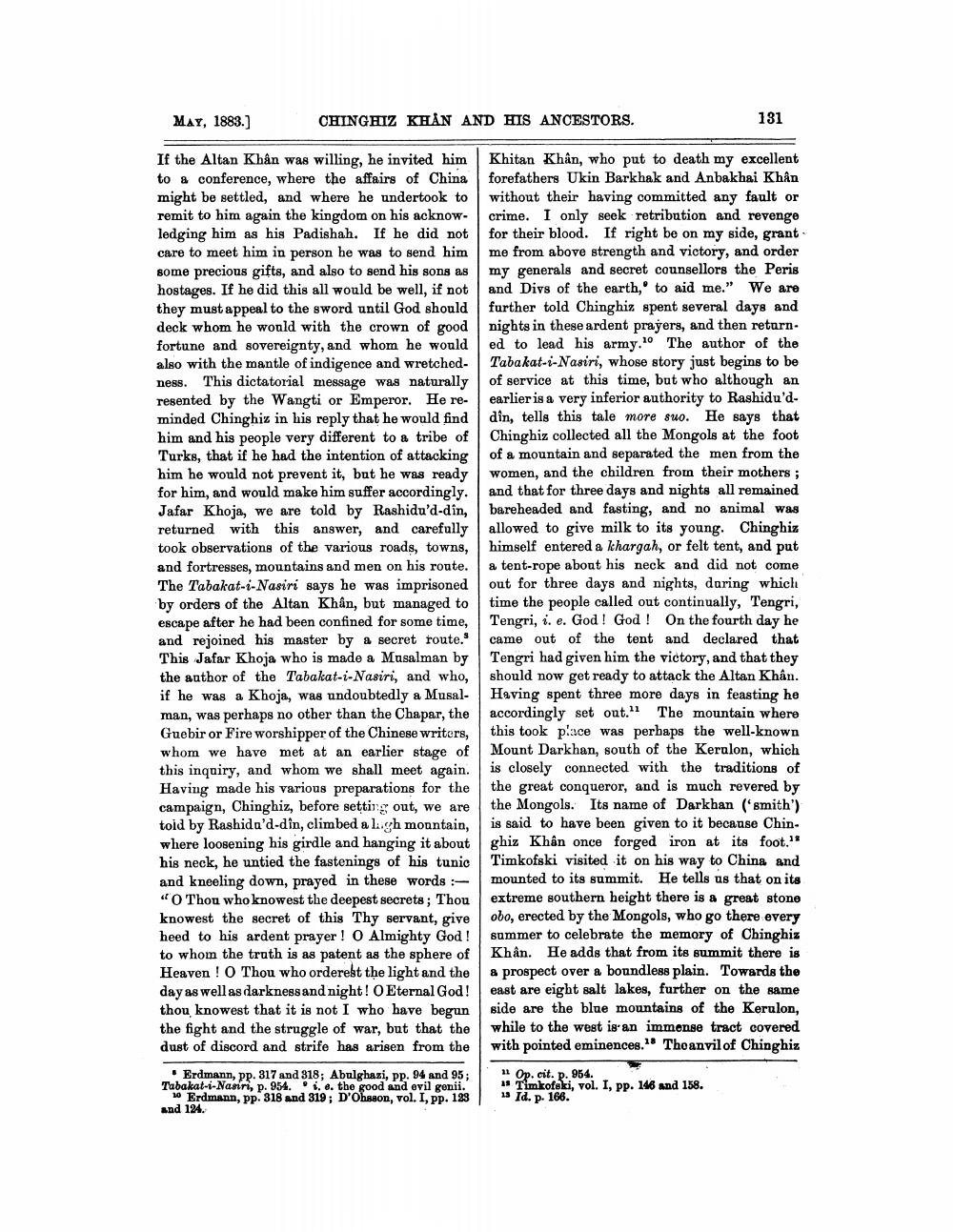________________
CHINGHIZ KHAN AND HIS ANCESTORS.
MAY, 1883.]
If the Altan Khân was willing, he invited him to a conference, where the affairs of China might be settled, and where he undertook to remit to him again the kingdom on his acknowledging him as his Padishah. If he did not care to meet him in person he was to send him some precious gifts, and also to send his sons as hostages. If he did this all would be well, if not they must appeal to the sword until God should deck whom he would with the crown of good fortune and sovereignty, and whom he would also with the mantle of indigence and wretchedness. This dictatorial message was naturally resented by the Wangti or Emperor. He reminded Chinghiz in his reply that he would find him and his people very different to a tribe of Turks, that if he had the intention of attacking him he would not prevent it, but he was ready for him, and would make him suffer accordingly. Jafar Khoja, we are told by Rashidu'd-din, returned with this answer, and carefully took observations of the various roads, towns, and fortresses, mountains and men on his route. The Tabakat-i-Nasiri says he was imprisoned by orders of the Altan Khân, but managed to escape after he had been confined for some time, and rejoined his master by a secret route. This Jafar Khoja who is made a Musalman by the author of the Tabakat-i-Nasiri, and who, if he was a Khoja, was undoubtedly a Musalman, was perhaps no other than the Chapar, the Guebir or Fire worshipper of the Chinese writers, whom we have met at an earlier stage of this inquiry, and whom we shall meet again. Having made his various preparations for the campaign, Chinghiz, before setting out, we are told by Rashida'd-din, climbed a ligh mountain, where loosening his girdle and hanging it about his neck, he untied the fastenings of his tunic and kneeling down, prayed in these words :"O Thou who knowest the deepest secrets; Thou knowest the secret of this Thy servant, give heed to his ardent prayer! O Almighty God! to whom the truth is as patent as the sphere of Heaven! O Thou who orderest the light and the day as well as darkness and night! O Eternal God! thou knowest that it is not I who have begun the fight and the struggle of war, but that the dust of discord and strife has arisen from the
Erdmann, pp. 317 and 318; Abulghazi, pp. 94 and 95; Tabakat-i-Nasiri, p. 954. i. e. the good and evil genii. 10 Erdmann, pp. 318 and 319; D'Ohsson, vol. I, pp. 123 and 124.
Khitan Khan, who put to death my excellent forefathers Ukin Barkhak and Anbakhai Khân without their having committed any fault or crime. I only seek retribution and revenge for their blood. If right be on my side, grant me from above strength and victory, and order my generals and secret counsellors the Peris and Divs of the earth, to aid me." We are further told Chinghiz spent several days and nights in these ardent prayers, and then returned to lead his army." 10 The author of the Tabakat-i-Nasiri, whose story just begins to be of service at this time, but who although an earlier is a very inferior authority to Rashidu'ddin, tells this tale more suo. He says that Chinghiz collected all the Mongols at the foot of a mountain and separated the men from the women, and the children from their mothers; and that for three days and nights all remained bareheaded and fasting, and no animal was allowed to give milk to its young. Chinghiz himself entered a khargah, or felt tent, and put a tent-rope about his neck and did not come out for three days and nights, during which time the people called out continually, Tengri, Tengri, i. e. God! God! On the fourth day he came out of the tent and declared that Tengri had given him the victory, and that they should now get ready to attack the Altan Khân. Having spent three more days in feasting he accordingly set out. The mountain where this took place was perhaps the well-known Mount Darkhan, south of the Kerulon, which is closely connected with the traditions of the great conqueror, and is much revered by the Mongols. Its name of Darkhan ('smith') is said to have been given to it because Chinghiz Khân once forged iron at its foot." Timkofski visited it on his way to China and mounted to its summit. He tells us that on its extreme southern height there is a great stone obo, erected by the Mongols, who go there every summer to celebrate the memory of Chinghiz Khân. He adds that from its summit there is a prospect over a boundless plain. Towards the east are eight salt lakes, further on the same side are the blue mountains of the Kerulon, while to the west is an immense tract covered with pointed eminences. The anvil of Chinghiz
18
131
11 Op. cit. p. 954.
1 Timkofski, vol. I, pp. 146 and 158. 13 Id. p. 166.




